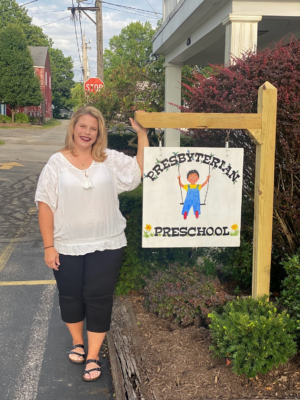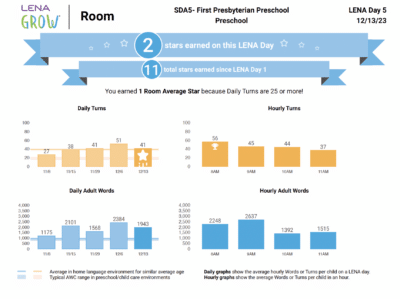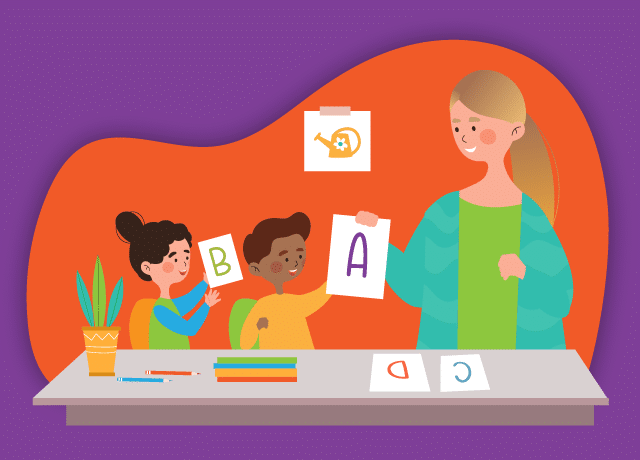Jennifer Gillis has more than 25 years of experience in early childhood education, yet her love of the profession, and for the children she teaches, is only getting stronger with time. Gillis serves as director and lead teacher at First Presbyterian Preschool in Salem, Ohio.
“It kind of goes back to my childhood,” she said. “I struggled with learning. I never really had anyone who taught me that as long as I kept trying, I could.”
It was only later in life that she was diagnosed with dyslexia. That’s part of what fuels the “why” behind her work.
“I just want them to believe in themselves,” she said of the children in her care. “I stay with it because they need someone who can tell them that no matter what it is, as long as they try, they can do it.”

Gillis doesn’t shy away from advocating for early childhood professionals. Far too often, their work goes unrecognized and undervalued. She went back to school to complete her bachelor’s degree in early childhood education at Notre Dame College of Ohio, earning her degree in the summer of 2023. She takes a philosophical approach to thinking about her role as an early educator. She recognizes that she’s the first teacher children will forget, but also the one who can have the biggest impact.
“I’ve always connected with little kids,” Gillis said. “Everyone has their niche, and my niche is little kids.”
And yet, as the years go by, motivation can wane. She often must remind herself why she does it.
“Well, it’s not the money,” she said with a chuckle. “You teach because you like it. You teach because you love it.”
She sometimes asks herself, “What made me passionate 20 years ago?” It’s a sort of reality check.
Renewing motivation through professional development
Some of what rekindles that passion for the profession is Gillis’s commitment to continuous improvement. When the Corporation for Appalachian Development, her local child care resource and referral agency (CCR&R), invited her to participate in LENA Grow® in the fall of 2023, she jumped at the opportunity.
LENA Grow is an evidence-based professional development program designed to help infant, toddler, and preschool educators create equitable, interactive language environments. At the heart of the program are strengths-based coaching sessions and a piece of innovative technology sometimes referred to as a “talk pedometer.”
LENA Grow has a laser focus on increasing the number of conversational turns, or serve and return interactions, that children experience. That narrow focus has been shown to lead to a much broader range of benefits and increases on assessment scores, including CLASS®, GOLD®, DECA, and LAP™ B-K, as well as teacher job satisfaction and retention.
Gillis expressed how LENA Grow helped her gain a better awareness of how much interactive talk each child is experiencing.
“What I took away from it was to be more aware of the children’s actual interactions,” she said.
While some teachers are a little apprehensive about LENA initially, Gillis took it all in stride. As even the most skeptical participants quickly understand, LENA Grow is not an assessment, and no one can ever listen to what is said.
The children also enjoyed the experience. By explaining to them that they would be superheroes, “like Iron Man,” on their designated LENA Days, Gillis got her students to wear the LENA vests without issues. As the weeks went by, her students became very comfortable with the devices and even began to look forward to wearing them.
Before having the evidence of the LENA reports, Gillis could only assume all her students were talking a lot and that she was interacting with each of them. The reports gave her a clearer picture, helping her pinpoint opportunities to use the 14 Talking Tips.
“You think some of them are talking, but they are not,” she said. “It gave us a little more guidance on knowing what to say and which direction to take the kids.”
Gillis displayed remarkable progress in her LENA Grow reports. Over the five-week program, Gillis experienced a substantial increase in daily conversational turns. One day, she even reached an incredible average of 51 conversational turns per hour per child. This is well above the average conversational turn range observed in preschool and child care environments.

Gillis said, “We have one little one who, when we started the program, didn’t say anyone’s name. I’ve never experienced this before. This changed halfway through the program. She started saying names and talking more. So her interactions started to go up. It was great to be able to tell her mom, ‘Yes, she is talking more. We can say, ‘She had this many interactions’ instead of just saying, ‘Oh yeah, she’s getting better.’”
System-wide change one classroom at a time
First Presbyterian Preschool is part of a statewide implementation of the LENA Grow program, headed up by the Ohio Child Care Resource and Referral Association (OCCRRA). In Ohio, LENA Grow fits into a wide-ranging ecosystem of investments that OCCRRA has made to address early childhood education quality, capacity, and workforce development.
OCCRRA first implemented LENA Grow in 2022 using COVID-relief funds from the American Rescue Plan Act (ARPA). Moving forward, the state is sustaining and scaling the program with more stable Preschool Development Grant (PDG) funds. In addition to Gillis’s local CCR&R, six other CCR&Rs manage the program and provide coaching services across the state.
OCCRRA’s executive director, Todd Barnhouse, called LENA Grow “an opportunity to bring niche expertise to strengthen our coaches that are working on the learning and development” of early childhood educators throughout the state.
“This was a really energizing initiative to roll out,” Barnhouse said. Hear more of what he shared about OCCRRA’s LENA Grow implementation during a recent webinar.
Jennifer Gillis is just one teacher. There are so many more like her, and there are always new teachers entering the field. Creating a system where they can all succeed takes time. Fair, equitable compensation and funding, as well as updates to structural issues such as teacher-child ratios, are early childhood education’s North Star. Gillis herself recognizes the importance of those systemic issues. She also sees that there are innovative ways to improve early childhood education in the here and now, and LENA Grow is among them.
“I’ve seen too many little ones who just say, ‘I can’t, I can’t’ and they won’t try,” she said. “I’ve just become more and more passionate about getting kids to try. Not to give up, not to think that they can’t, just that they can.”
[callout]



